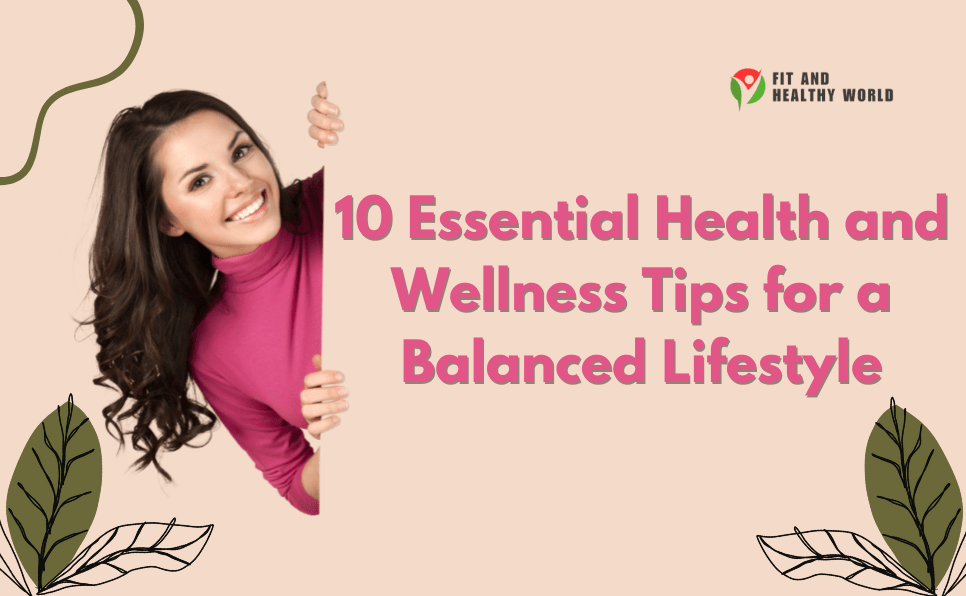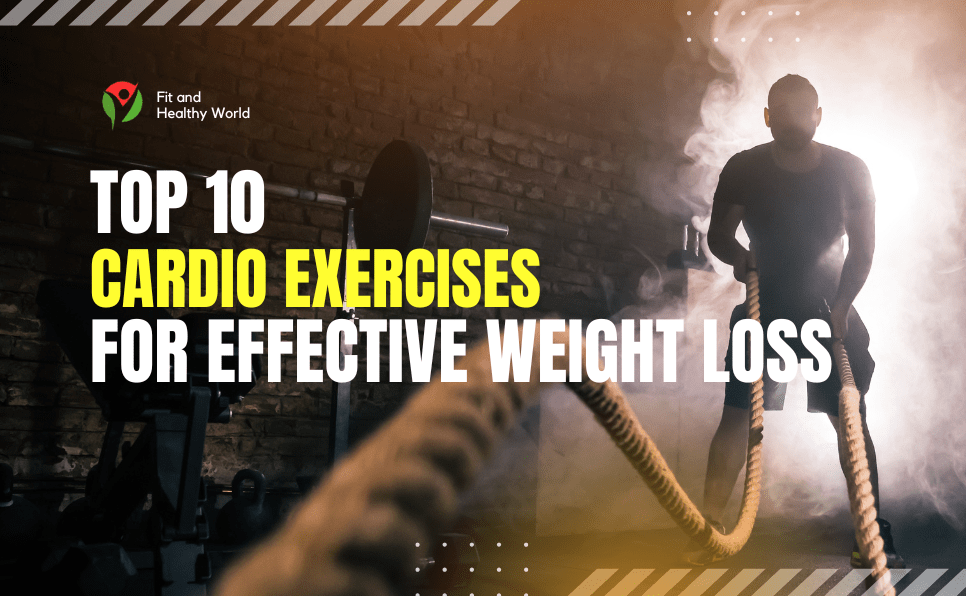It takes more than just eating well and working out periodically to stay well and retain wellness. Finding balance in all facets of life—from physical health to mental wellness and lifestyle decisions—is the goal. This article will discuss ten effective health and wellness suggestions that address key facets of overall wellbeing. You can live a balanced and fulfilling life with the aid of these little but essential measures. For more insights on wellness, explore Fit and Healthy World.
Establishing a Firm Basis: Health and Well-Being
The foundation of general health is physical well-being. It has an everyday impact on our thoughts, feelings, and behaviors. We can greatly enhance our quality of life by attending to our physical well-being.
Appropriate Diet Maintaining good nutrition is crucial to physical well-being. Healthy fats, proteins, carbs, vitamins, and minerals are all part of a balanced diet. Assure yourself of:
- Consume an array of vividly colored fruits and vegetables
- To stay hydrated, sip a lot of water.
- Avert processed foods that are heavy in sugar and bad fats.
- Eat more foods high in nutrients to gain energy and stave against chronic diseases like diabetes and heart disease.
Everyday Exercise It’s not necessary for exercise to be difficult. Your health can be significantly enhanced by simple activities like riding, dancing, or walking. Goal:
- 30 minutes of moderate physical activity everyday
- Including at least two strength-training sessions every week
- taking quick pauses from your desk job to stretch and move about
- These routines strengthen muscles, boost energy, and encourage improved posture.
These routines strengthen muscles, boost energy, and encourage improved posture. Find more fitness tips at Fit and Healthy World.
Giving Mental Health Priority for Emotional Sturdiness
Your physical and emotional well-being are equally vital. Having a positive outlook improves your emotional health and helps you cope with stress.
Engage in mindfulness and meditation. Being mindful eases worry and keeps you in the moment. One technique for cultivating consciousness is meditation. You could:
- Begin by deep breathing for five minutes every day.
- To stay grounded, concentrate on your environment or your physical sensations.
- Think about your blessings or record them in a gratitude diary.
- In times of stress, mindfulness meditation can help you to relax and gain clarity.
Methods of Stress Management Sometimes life feels too much to handle. It’s essential to learn how to handle stress. Some coping mechanisms are as follows:
- Divide work into more manageable, smaller steps.
- To relax, practice deep breathing.
- Make time for self-recharge by taking regular pauses.
- By using stress management techniques, you can avoid burnout and increase your mental clarity.
Creating Long-Term Well-Being Through Healthful Lifestyle Practices
Your quality of life can be improved by forming healthy lifestyle practices. Small adjustments can have a large impact; consistency is essential.
Establish and Maintain a Routine Having a regular daily schedule keeps you stress-free and organized. Routines encourage structure, whether they involve an early workout or a consistent bedtime. Here are a few pointers:
- Plan your activities ahead of time
- Establish dedicated periods of time for work, rest, and leisure.
- Make regular self-care activities a priority.
- Maintaining routines gives you consistency and makes reaching your health objectives easier.
Take Screen Breaks to Reverse Digital Detox It’s simple to lose hours gazing at displays in our technologically advanced society. Spending too much time on screens can cause eye strain and impair mental clarity. Try to:
- Only spend a few hours a day on screens.
- Take part in outdoor pursuits to detach.
- Prior to going to bed or during meals, schedule screen-free periods.
- A digital detox aids in mental renewal and reestablishing awareness of your environment.
Maintaining routines gives you consistency and makes it easier to reach your health goals. Explore more about building healthy habits at Fit and Healthy World.
Communities and Social Networks for Supporting Wellbeing
Wellness is significantly impacted by social ties. Emotional well-being can be enhanced by strong social ties.
Establish Robust Support Systems A sense of belonging is created via relationships with family and friends. To make these connections stronger, think about:
- Having time to spend with those you love
- Taking part in social gatherings or clubs where you might meet new individuals
- relying on friends for emotional support when things are tough
- Relationships with others lessen loneliness and give emotional support.
Take Part in Projects for Community Wellbeing You are more likely to stick to your health objectives when you are a part of a wellness group. You could:
- Take part in exercise programs or wellness events in your community.
- Participate in programs that support healthy living at work.
- Participate as a volunteer in local health programs
- Your sense of purpose and accountability can grow as you become involved in the community.
The Secrets to Long-Term Health: Self-Care and Preventive Care
You can avoid later, more serious health problems by adopting preventive measures today. Taking care of yourself keeps your body and mind in balance.
routine examinations for health Early detection of potential health issues is crucial with preventive care. Be sure to:
- Make plans to see your doctor annually.
- Maintain current immunization and screening records.
- Observe your vital indicators, such as cholesterol and blood pressure.
- Frequent exams ensure prompt treatment by assisting in the early detection of health issues.
Give Self-Care Practices Priority Long-term health depends on taking care of your bodily and emotional needs. Several self-care techniques consist of:
- Spending leisure time engaging in hobbies, reading, or receiving spa services
- To reduce stress, try yoga or meditation.
- honoring your body’s needs for rest and relaxation
- You may stay optimistic and rejuvenated by practicing self-care.
Common Questions and Answers (FAQs)
Which books are the greatest for learning how to lead a physically healthy lifestyle?
Highly recommended readings are “The Four Pillar Plan” by Dr. Rangan Chatterjee, “How Not to Die” by Dr. Michael Greger, and “The Blue Zones” by Dan Buettner.
Which websites offer the most trustworthy sources of medical and health information online?
Reputable resources include WebMD, Healthline, and Mayo Clinic. Expert-reviewed, evidence-based health advice can be found on these websites.
Which health and wellness advice do you think is the best?
- Have a lot of water.
- Every day, relocate
- Obtain adequate rest.
- Be cautious of your surroundings.
- Maintain your social media presence
Which 10 health-related tips are there?
- Continue to drink water.
- Work out frequently
- Consume well-balanced meals.
- Get 7 to 8 hours of sleep.
- Reduce screen time and cultivate mindfulness
- Continue to maintain social relationships
- Control your stress
- Attend routine examinations.
- Allocate time for your interests.
Which five guidelines should one follow for a healthy lifestyle?
- Consume complete, wholesome foods.
- Move every day and get regular sleep
- Reduce stress by practicing mindfulness
- Take in adequate water.
Which seven physical health tips are there?
- Work out frequently
- Consume well-balanced meals.
- Continue to drink water.
- Retain appropriate sleeping habits
- Adopt proper posture.
- Stay away from processed foods.
- Take pauses when you are sitting.
Which eight domains of health and wellness are there?
- Wellness in terms of the body, mind, emotions, and society
- Cognitive Well-Being
- Environmental Wellness and Occupational Health
- Emotional Well-being



